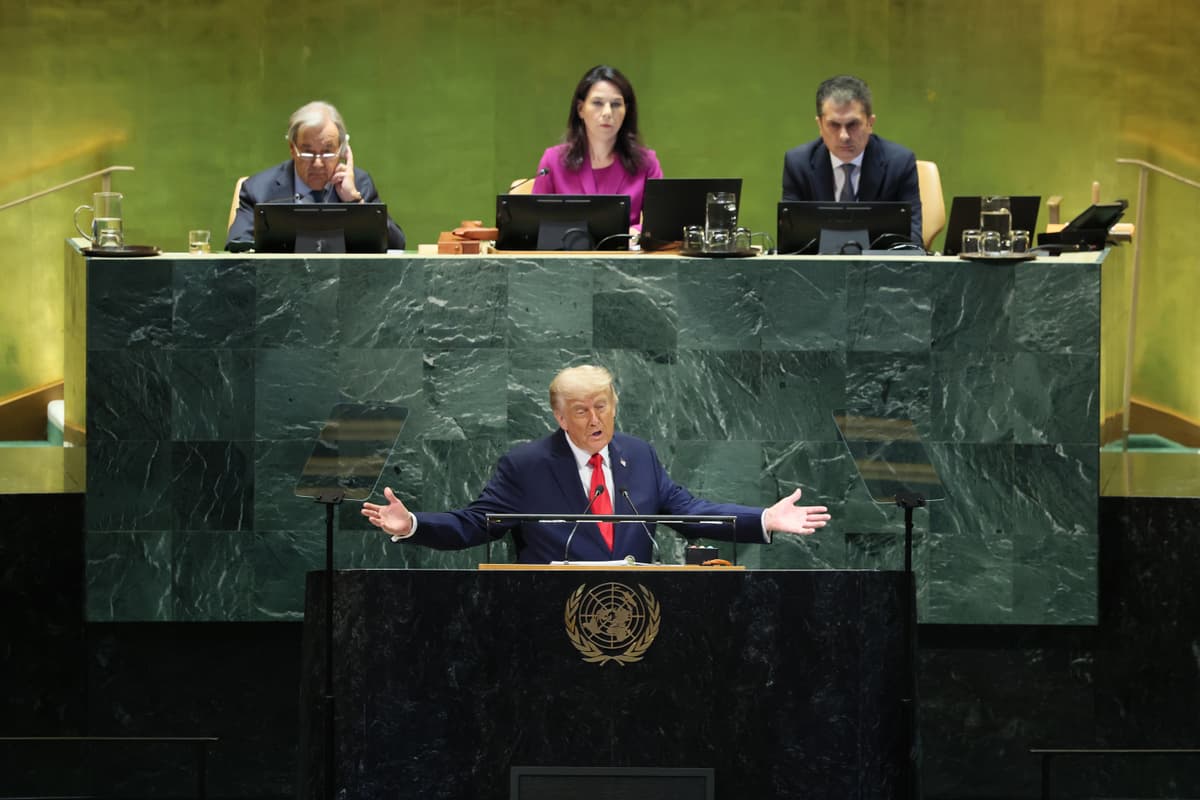UN, in a Historic Development, Endorses Trump’s Ambitious Peace Plan for Gaza — Aiming To Revamp Lives in War-Torn Strip
Russia, Chinese Communists abstain as Security Council enacts resolution that is proposed by America and minimizes UN’s role in the region.

President Trump’s ambitious peace plan for Gaza is now endorsed by the United Nations, where the Security Council enacted an American-proposed resolution that aspires to revamp lives on the war-torn Strip on Monday, which for the first time minimizes the role of Turtle Bay in the future of the region.
Only two of the council’s 15 members, Communist China and Russia, abstained on the vote, while all others supported a resolution. The vote, the American ambassador to the UN, Mike Waltz, said, “represents the first real step in generations towards forging a lasting peace for Gaza, for Palestinians, for Israelis, and for the entire region.”
Many members of the council stressed the resolution’s call for a “path” toward Palestinian statehood, which Israel opposes, and Arabs pressured Washington to include. The passage was added in part because Mr. Trump is eager to add Saudi Arabia to the Abraham accords. Riyadh demands the establishment of a Palestinian state before it can normalize relations with Israel.
Perhaps as an added incentive, Mr. Trump said Monday that he intends to sell 48 advanced F-35 fighter jets to Riyadh, whose de-facto ruler, Crown Prince Mohammed bin Salman, is due to visit the White House on Tuesday. The sale, however, might be delayed, as several onerous conditions have to be met first.
The UN resolution establishes a Board of Peace, which Mr. Waltz made clear would be led by Mr. Trump. It also envisions an International Stabilization Force, consisting of troops from several countries. It would initially maintain security in the Strip and train Palestinians to take over. It will be led by America and operate outside of the UN’s peacekeeping department.
Even as those bodies are being formed, though, Hamas is reconstructing its governance in areas currently under its control. The areas are just under a half of Gaza’s territory. Israel, which maintains a presence in the southern part of the Strip, says that nothing will proceed before Hamas is gone, and its arms laid down.
“We are determined to make sure that Hamas will be disarmed,” Israel’s ambassador to the UN, Danny Danon, told reporters before the vote. “It is a core requirement of this resolution” to “make sure that Hamas will not pose a threat against Israel.” Messrs. Danon and Waltz also said that the first stage of the Gaza cease-fire, the release of all hostages, is yet to be completed. Remains of three deceased hostages are yet to be returned to Israel.
The proposed multinational force, Mr. Waltz said, would consist “a strong coalition of peacekeepers, many from Muslim majority nations like Indonesia, Azerbaijan, and others, to deploy under a unified command. These brave souls will secure Gaza streets. They will oversee demilitarization. They will protect civilians, and they will escort aid through safe corridors, all while Israel phases out its presence and a vetted Palestinian police force takes on a new role.”
While he named Indonesia and Azerbaijan, other would-be contributors are publicly opposed by Israel. Specifically, Jerusalem says that Turkey and Qatar, two backers of the Muslim Brotherhood and Hamas, should have no role in post-war Gaza. Several Arab countries also quietly say they would limit support if those countries participate in the endeavor.
Another unclear part of the resolution is which Palestinians would be trained by the international force to take over after it leaves. Israelis are concerned that Hamas by any other name would use that mechanism to eventually reestablish its power. Members of Prime Minister Netanyahu’s cabinet also object to the resolution’s aspiration for a path toward Palestinian statehood.
“After the PA reform program is faithfully carried out and Gaza redevelopment has advanced, the conditions may finally be in place for a credible pathway to Palestinian self-determination and statehood,” according to the resolution. “Our opposition to a Palestinian state on any territory has not changed,” Mr. Netanyahyu countered during a Sunday cabinet meeting.
At the same time, though, the premier told hawkish members of his coalition that the path to statehood, as delineated in the resolution, is more aspirational than actual. He also noted that past UN resolutions have called on the establishment of a Palestinian state.
Russia and Communist China lamented the lack of UN supervision in the resolution, which Moscow’s UN ambassador, Vassily Nebenzia, called a “pig in a poke.” In essence, he said, “the council is giving its blessing to a U.S. initiative on the basis of Washington’s promises, giving complete control over the Gaza strip to the board of peace and the ISF, the modalities of which we know nothing about so far.”

